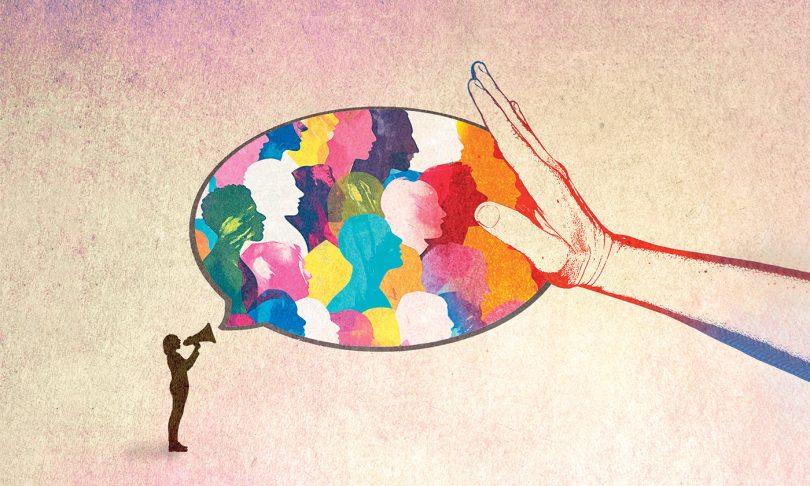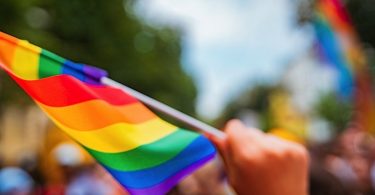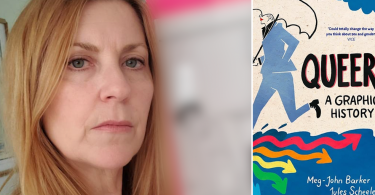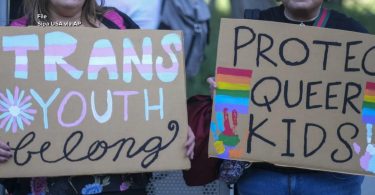Illustration by Getty Images/Natalie Pryor
Queering Objectivity
Identity is not an impediment to good journalism.
LGBTQ journalists manage a mighty breadth of work. We are reporting in our local communities, tracking anti-queer and trans legislation across the United States, championing queer and trans youth, highlighting queer and Palestinian solidarity movements, and keeping the pulse on culture, community organizing, and so much more.
Still, despite the caliber and depth of this reportage—and the vital work of organizations like the Trans Journalists Association and NLGJA: The Association of LGBTQ+ Journalists (the latter of which I am a member)—the media industry often leaves LGBTQ reporters, stories, and subjects in the cold.
“I could count on one hand the number of trans journalists I know,” says Lex McMenamin, Teen Vogue’s news and politics editor. We’re talking over Zoom about the state of journalism, LGBTQ rights, and the 2024 presidential election. When I name the other journalists and media workers I interviewed for this article, McMenamin nods, already knowing them all.
A 2024 report from Media Matters for America and GLAAD confirms McMenamin’s perception. The report found that in 2023 The New York Times—often considered a gold standard in journalism—excluded trans voices from 66% of its articles about anti-trans legislation. Additionally, 18% of those articles platformed anti-trans misinformation and activists without sufficient fact-checking, context, and in some cases, disclosures of sources with extremist anti-trans backgrounds. This lack of competency isn’t just reserved for “the Gray Lady.”
In 2021, GLAAD gave major media outlets, including CBS News, CNN, The Hill, The New York Times, and Newsweek a “failing grade” for their coverage (or lack thereof) of the historic Equality Act, which would have prohibited discrimination on the basis of sex, gender identity, and sexual orientation at a federal level.
As the 2024 U.S. presidential election approaches, this media landscape matters more than ever. Accurate, factual, and culturally responsive journalism protects the public, safeguards democracy, and can help push back against efforts to use LGBTQ people for political leverage on both sides of the aisle. On one hand, many Republicans use anti-trans policies and rhetoric to whip up their base and mobilize conservative voters, though some research indicates these strategies actually aren’t effective.
Lex McMenamin
Teen Vogue’s news and politics editor
And on the other, Democrats often see LGBTQ people as a core, and steadily growing, reliably blue voting bloc, regardless of whether the White House actually makes good on any promises to our communities. Ironically, historically marginalized people often face blame during election cycles for not voting in greater numbers, despite the widespread voter suppression tactics many citizens, especially those in Black and Brown communities, experience.
In fact, it is often our identities that make queer journalists (and others from historically marginalized communities) so uniquely equipped to meet the challenges of this media landscape and provide the nuanced, equitable reporting that everyone—not just LGBTQ communities—so desperately needs. Journalists with lived experience in the communities on which they report can sniff out sources with a shoddy agenda, are likely to avoid harmful stereotypes, and can use their experiences to inform how they approach a story, asking pointed questions that outsiders may not consider.
At a time when LGBTQ people are censored and sensationalized on and off the page, it is queer and trans journalists who are able to flip the script, expose tired and violent narratives, cultivate equitable relationships with sources, and recenter our humanity.
First and foremost, journalism needs to reckon with its own bedrock assumptions around “objectivity,” which mandates reporters be neutral, third-party observers. In practice, this often means a reporter’s identity, contextual knowledge, or firsthand experience of an issue is seen as a detriment to their coverage, rather than a simple fact of their existence—and a benefit to their reportage.
I’ve experienced this firsthand. There have been people and stories I’ve been able to access solely because of my identity; some people have been so burned by journalists and their poor handling of LGBTQ stories they will only agree to speak with members of their own community, who have an established history of fair and accurate coverage.
“We’re up against some really dated and unuseful conceptions around objectivity,” says McMenamin. “We hear from reporters at local outlets who are maybe the one out person at the office and are being told they can’t cover book bans because they’re queer.”
As a result, reporters who are not white, male, and/or cisgender are often prevented from reporting on their own communities, covering their beat, or providing factual context or relevant critique because of those identities. After the 2016 election, for example, trans journalist Lewis Raven Wallace wrote a Medium post criticizing objectivity standards—and was promptly fired from his public radio job.
Likewise, in 2020, Alexis Johnson, a Black reporter at the Pittsburgh Post-Gazette, was barred from covering the Black Lives Matter movement after a tweet, which her editors alleged expressed bias. The end result is that the journalists who are often most qualified to report on their beat are held to a punitive standard, while their often cis white male counterparts are still seen as “neutral.”
Likewise, in 2020, Alexis Johnson, a Black reporter at the Pittsburgh Post-Gazette, was barred from covering the Black Lives Matter movement after a tweet, which her editors alleged expressed bias. The end result is that the journalists who are often most qualified to report on their beat are held to a punitive standard, while their often cis white male counterparts are still seen as “neutral.”
Imara Jones
Journalist, news producer, and creator of TransLash Media
“It’s ridiculous to say that because you’re trans you can’t report on the trans community,” says Imara Jones, journalist, news producer, and creator of TransLash Media. “Who better to report on the trans community than trans people, because you know your beat. No one ever says because you are a white man in New York City that you can’t cover other white men in New York City.”
Aside from these problematic norms around objectivity, there are other forces shaping how queer and trans stories are told and by whom.
In her investigative podcast series The Anti-Trans Hate Machine, Jones and her team track the ways anti-trans ideas bleed into mainstream media and politics. Through their work, they uncovered a “disinformation ecosystem”—created and funded by a shadowy and highly organized cohort of Christian nationalists, the mega-wealthy, and other right-wing organizations and politicians—that effectively disseminates anti-trans lies through some of the largest and most respected newsrooms in the U.S. (Disclosure: I worked with TransLash Media as a News and Narrative Fellow in Spring 2023, and Jones edited my work for the site.)
Before long, anti-trans advocates (and their pseudoscience) have a legitimizing platform in outlets like The New York Times or The Atlantic, which publish articles that are then used by anti-trans activists and even judges in legal proceedings, forming a violent feedback loop between media, policy, and public opinion.
Sports are the perfect example. Freelance journalist Frankie de la Cretaz says sports media was completely unprepared to cover the anti-trans rhetoric that has overtaken women’s sports. “The anti-trans movement, particularly around sports, has been able to leverage sports as one of the few [and] first places they could gain ground,” de la Cretaz says. Trump and other GOP candidates, for example, are already pledging to exclude trans women from sports teams.
“We have seen it coming for years,” says de la Cretaz. “And now it is here and publications just do not have the ability to cover it with the attention or nuance that it deserves. … There’s really no trans people in the room.”
Frankie de la Cretaz
Freelance journalist
This is especially concerning as many people lack the media literacy skills required to identify poor journalism or disinformation. According to the advocacy nonprofit Media Literacy Now, 62% of adults lacked any opportunity to learn about or analyze media messaging in high school. Even for media consumers who do have the skills, many lack the time to research the backgrounds of the writer, publication, and each source or expert included or excluded in the article and analyze for bias. (Sites like Assigned, however, cover and debunk anti-trans messaging in the media and beyond.)
“Christian nationalist media is the singular most powerful media in the country,” says Jones. “It has the ability to shape conversation through its breadth and its reach like no other media. There’s no other rival to it because it acts as a continuous pipeline from the darkest corners of the internet to more mainstream places on the internet that are then fed into places with enormous reach like Daily Caller and Daily Wire.”
Taken together, this means many newsrooms and media outlets are not only siphoning qualified reporters from some of the most urgent political issues in the country, but also that the industry itself is unable to properly identify and respond to coordinated threats from extremist, anti-LGBTQ factions. And this says nothing of the slashed budgets, relentless layoffs, strikes, and union busting that undermine journalism as a whole.
This election season, LGBTQ journalists are gearing up to tell accurate and nuanced stories in their local communities, on the campaign trail, and across the country—but they need support, too.
Daniela Capistrano
Media worker, editor, founder of DCAP Media
James Factora, a staff writer for the LGBTQ-focused digital publication Them, says they’ll be focusing on the community organizers ensuring there are “networks of care for queer and trans people,” regardless of who’s in the White House. “The most marginalized trans people, namely Black trans women and trans women of color, are still going to experience systemic violence, and it’s important to highlight that the people who really have our backs are our communities,” Factora says.
Daniela Capistrano, a media worker, editor, and founder of the digital strategy company DCAP Media, says there needs to be more public funding for and emphasis on local journalism—especially since so much anti-LGBTQ legislation is being proposed and passed in the South and Midwest. Investing in local, ongoing reporting is “how we’re getting more stories about resistance from the Midwest and the South,” they add.
On an industry level, Capistrano says increased union representation for media workers and more equitable access to grants, mentorship, and funded opportunities would also support journalists and their work. While the process of unionizing can be complex, Capistrano points to the Working Families Party’s labor and unionization toolkit as a helpful resource for workers to begin exploring their options.
For Jones, protecting trans people requires two things: telling trans stories from a range of trans people and telling the world what trans people are experiencing. And the stakes are high, she explains: “We think that those two things together are the way that we can both save trans lives and protect democracy.”
is a lesbian journalist, editor, and author. She covers identity, power, culture, and health. In addition to being a YES! contributor, Youngblood Gregory’s work has been featured in The New York Times, New York Magazine, The Guardian, Cosmopolitan, and many others. Most recently, they were the recipient of the 2023 Curve and NLGJA Award for Emerging Journalists. Get in touch at saragregory.org.
Fall 2024
Truth
TABLE OF CONTENTS
Truth and Reckoning
Safer Sex Work
Serving Justice
Terra Affirma: Lives of Grass
Voices Beyond Votes
Survivors at the Center
Untangling the Roots of Wild Foods
Choose Us Over Guns
This Is Your Brain on Truth
Radical Readers
Queering Objectivity
False Prophets of Profit
Monumental Shifts
Reflection







